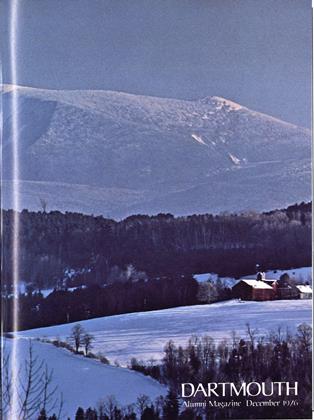As narrative histories, Prelude to Disaster and The Last Chopper succeed in presenting in clear and lively style an account of America's long, unhappy involvement in Vietnam as seen consistently from the point of view of the American Establishment. The author has aspired, however, to make his two-volume history of America's role in Vietnam something more than a summary of American journalism of the period under study, though it is in part that, and in so doing he invites controversy. Weldon A. Brown has set for himself the formidable task of explaining and interpreting not only what we were doing in Vietnam, but what we should have been doing there.
Unhappily, the author writes as if the lesson of the limitations on American power, a lesson imposed on us since the mid-1960s at least, had never been learned. His interpretive framework is drawn from a Kennedy-esque Cold War idealism that holds that America's historic mission is to bear any burden, pay any price, in defense of liberty at all times and in all places. He never seriously doubts that America should have been involved in Vietnam, but holds that we failed there primarily because we allowed our effort to become merely anti-communist rather than actively pro-freedom. He finds few heroes or villains among either hawks or doves, but finds many in both camps who failed to up-hold America's highest ideals. On the other hand, there is no doubt as to who was The Enemy: Ho Chi-minh, though grudgingly acknowledged as a nationalist, is grouped with other modern communist revolutionary leaders as the head of a "determined, ruthless minority" that would "scheme, deceive, and intimidate" its way into power. Professor Brown holds that America could successfully have fostered a nationalistic, democratic, capitalist alternative to communist power in Vietnam, and therefore had an obligation to try to do so. The tragedy, as he sees it, is that we failed in what we could have done.
This interpretation has been rejected by most students of the Vietnamese War and, in this reviewer's opinion, with good reason. To hold it one must believe that South Vietnam was a legitimate, independent nation, that there is inevitably a conflict between nationalism and communism, that oppressed peasants, if properly informed of alternatives, would invariably reject communist revolution, and that the political values of one civilization can be transplanted to another. If nothing else, the Vietnamese war has cast doubt on all of those propositions.
In part the problems of these two books must derive from the very narrow research base on which they were written. The bibliographies of both books consist almost entirely of popular books, periodicals, and newspapers published in the United States during the period of America's involvement in Vietnam. The rather different viewpoints of British and French journalism were ignored; almost no works by Vietnamese writers were consulted; the very substantial body of dissenting literature inspired by the American anti-war movement hardly is hinted at. Most seriously, the author apparently did not avail himself of the few genuine works of serious scholarship on Vietnamese history published in this country in recent years. Had he consulted the works of Marr, Woodside, or Ngo Vinh Long on the historical roots and modern development of Vietnamese nationalism, it would have been hard for him to maintain that any foreign intervention, no matter how "pro-freedom," would have been acceptable to a nation in the last stages of a hundred-year struggle against colonialism.
The books under review seem, in the end, like an anachronism. They can be recommended only for a single, peculiar reason: reading them allows one to step through a time-warp to see again the type of misguided idealism that got us mired in Vietnam in the first place.
PRELUDE TO DISASTERTHE LAST CHOPPERBy Weldon A. Brown '33Kennikat, 1975 & 1976278 & 371 pp., each $15
Professor Major is a far eastern specialist inDartmouth's history department.
JOHN S. MAJOR
Books
-
 Books
BooksBOSTON POSTAL MARKINGS TO
January 1950 By C. N. Allen '24 -
 Books
BooksBREAD AND BUTTER BASKETBALL.
December 1960 By CLIFF JORDAN '45 -
 Books
BooksALUMNI PUBLICATIONS
April, 1923 By F. E. BROWN. -
 Books
BooksMIXING THE RACES IN HAWAII
March 1938 By Francis E. Merrill '26 -
 Books
BooksStatistical Analysis
April 1926 By Gilbert H. Tapley -
 Books
BooksFLAUBERT IN EGYPT: A SENSIBILITY ON TOUR. A NARRATIVE DRAWN FROM GUSTAVE FLAUBERT'S TRAVEL NOTES & LETTERS
December 1973 By JOHN HURD '21












